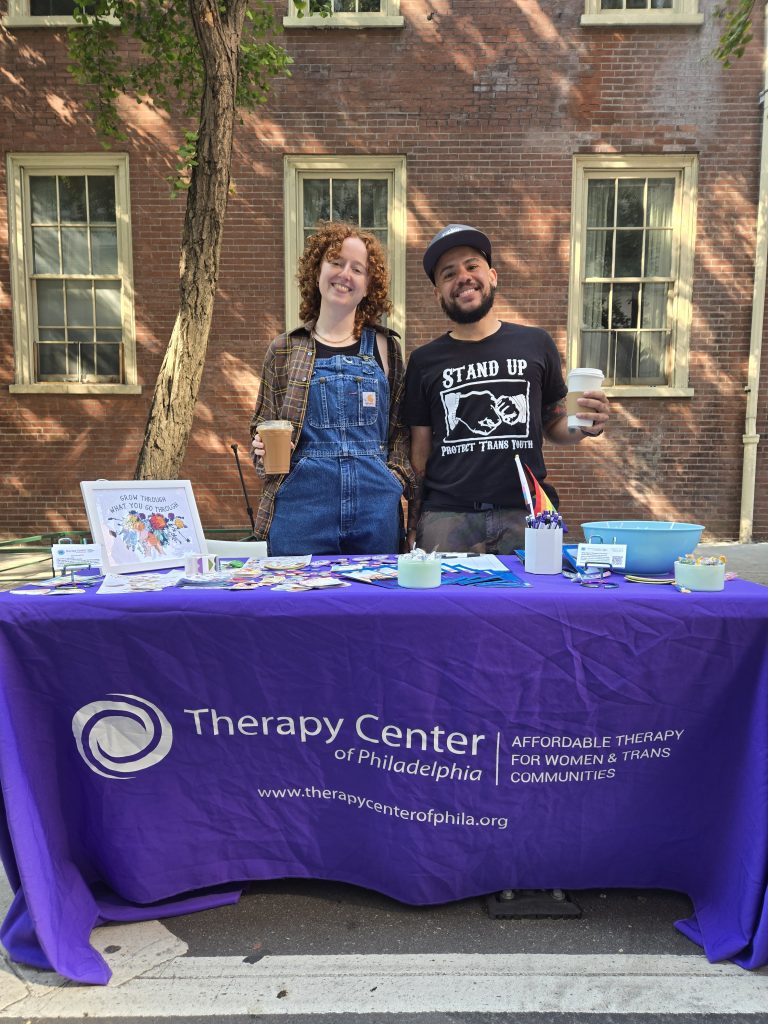Therapy Center of Philadelphia (TCP) is an historically women’s and feminist non-profit in Philadelphia that decided to address the issue of becoming fully anti-racist and trans-inclusive/affirming head on. TCP has provided quality affordable psychotherapy to low-income women since 1972. We continue to play a unique role in filling the mental health care gap for low-income women in Philadelphia. Currently named Therapy Center of Philadelphia (TCP), TCP offers individual, couples, and group psychotherapy to more than 350 clients a year, all on a sliding fee scale.
Since 2007, TCP has increased our provision of more advanced psychotherapeutic interventions that have demonstrated more lasting positive outcomes. This is in contrast to community behavioral health centers that are overwhelmed with caseloads and focus on symptom/crisis reduction and therefore aren’t able to address the root of the problem. TCP’s model provides a different avenue of support for clients who seek to address root issues and create long lasting change. Our appointment show rate is 90%, compared to 50% in community mental health clinics, which speaks to the strong connections TCP therapists build with their clients – a key element leading to positive outcomes.
TCP was founded in 1972 under the name of the Feminist Therapy Collective by a group of visionary therapists seeking to challenge gender and class biases that existed in the mental health system at the time. These clinicians identified a group of women who were working but were under or uninsured and did not qualify for subsidized benefits. These clients were in a precarious position and were falling through the cracks in the health care system. They were supporting their families yet often only a paycheck away from poverty. They were housekeepers, hair dressers, nannies, baristas, waiters, sex workers, artists, and students. They wanted emotional support but many barriers prevented them from accessing help – long waiting lists, insurance requirements, lack of finances, lack of transportation, and fear of stigma and judgment. Thus the Feminist Therapy Collective (FTC) was formed.
FTC was centrally located to public transportation, had no waiting list, and used a sliding fee scale to offer clients a fee 1/3rd the market rate for services. The FTC therapists offered care that promoted healing and growth over pathology and profit. Currently Therapy Center of Philadelphia (TCP), the agency continues to be committed to removing these barriers and providing psychotherapy that is healing and transformative. TCP’s mission today is to nurture individual well-being and personal growth by providing high-quality, affordable psychotherapeutic services in a feminist environment. We create this feminist environment by supporting client empowerment, collaboration, a de-emphasis on diagnosis, striving for racial equity, and on the recognition that the way in which we experience oppression is influenced and shaped by our concurrent identities. We strive to make our services trans-affirming and welcome all who have transgender identities and experiences.
We have identified 8 core values that guide our work with clients:
- Personal Growth: Individuals have the inner resources and the capacity to grow and thrive to their full potential.
- Partnership: Clients are active participants in shaping their own treatment.
- Understanding: With a commitment to social justice, we approach therapy with the understanding that relationships, social context and oppression affect one’s sense of self and well-being.
- Accessibility: We utilize a sliding scale fee structure to make our services affordable to more people.
- Inclusiveness: We welcome women, transgender individuals, and their families without regard to race, class, cultural background, or sexual orientation.
- Community: A supportive, collaborative, and stimulating environment for our therapists underlies our ability to provide high quality services to our clients.
- Holistic Approach: Psychotherapy is not a cure-all; we encourage our clients to pursue other avenues to self-realization through the arts, athletics, body work and other modes for healing.
- Accountability: TCP is committed to being accountable to the ways in which feminism has been and can still be divisive within communities of color, lesbian/queer communities, and within transgender communities and works towards offering a mental health space that strives to attend to these experiences intentionally and directly.
